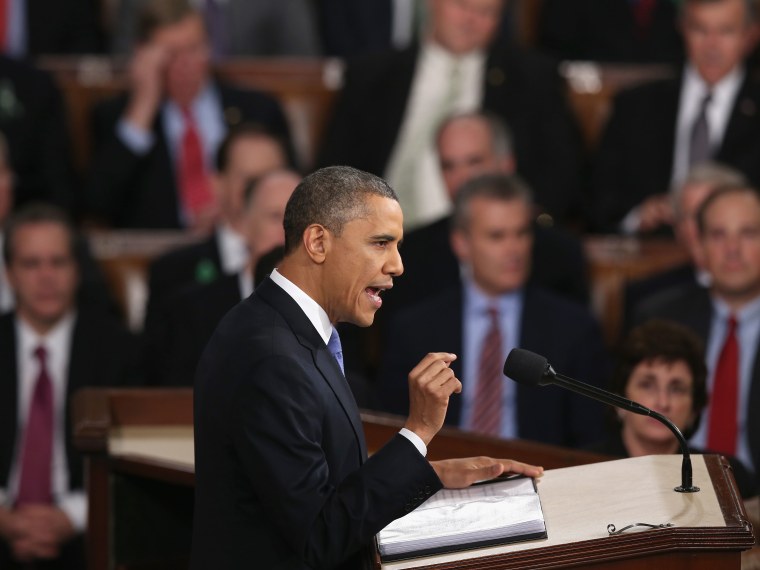President Barack Obama put deficit reduction near the very front of his 2013 State of the Union address and again called for a "balanced approach" which would include both revenue and spending cuts.
"Over the last few years, both parties have worked together to reduce the deficit by more than $2.5 trillion," he said. "Mostly through spending cuts, but also by raising tax rates on the wealthiest 1% of Americans. As a result, we are more than halfway towards the goal of $4 trillion in deficit reduction that economists say we need to stabilize our finances."
The president highlighted two policies which he said would help "finish the job": Medicare reform and the elimination of various tax deductions. Though he did not delve very far into specifics, he said that his proposed Medicare reforms would "reduce taxpayer subsidies to prescription drug companies and ask more from the wealthiest seniors."
To reform the tax code, Obama suggested "getting rid of tax loopholes and deductions for the well-off and well-connected," though he did not single out any specific deductions for eradication. He also vowed that more comprehensive tax reform could deliver "a tax code that ensures billionaires with high-powered accountants can't pay a lower rate than their hard-working secretaries; a tax code that lowers incentives to move jobs overseas, and lowers tax rates for businesses and manufacturers that create jobs right here in America."
The president also took care to say that nothing else in the speech would undermine his deficit-cutting ambitions. "Nothing I'm proposing tonight should increase our deficit by a single dime," he said. "It's not a bigger government we need, but a smarter government that sets priorities and invests in broad-based growth."
How the president would then pay for some of the other proposals in Tuesday's State of the Union remains to be seen. What clues the president gave signal a greater reliance on private financial support in order to accomplish public goals. For example, to fund his planned infrastructure upgrade, Obama proposed an initiative called Partnership to Rebuild America which would bring in private companies to fund various infrastructure projects. Similar policies have already been attempted in various states and localities.
However, it remains unclear where the money for universal preschool would come from. President Obama may have dropped a hint when he lauded the success of New York's P-Tech high school—a charter school opened in partnership with IBM, which also contributed $500,000 in funding.
Some progressive economists question whether $1.5 trillion in further deficit reduction is even necessary. New York Times columnist and Nobel Prize-winning Keynesian economist Paul Krugman has argued that there is "no big problem in the medium term, no strong case for worrying now about long-run budget issues" and instead urged Washington focus on job creation.
Additionally, according to the Economic Policy Institute's Ethan Pollack, " targeting a specific deficit savings number—let alone one this large—is a mistake because both the timing and composition of any deficit reduction should be conditioned on the actual state of the economy, not rosy assumptions that the economy will have automatically rebounded to full employment four years from now." Instead, he too proposes "substantial up-front stimulus."
Republicans also rejected the president's "balanced approach," albeit for very different reasons. In his rebuttal to the State of the Union, Senator Marco Rubio dismissed the possibility of tax increases and called for a budget amendment which would set a permanent cap for federal spending.
In the Tea Party response, Senator Rand Paul said, "Not only should the sequester stand, many pundits say the sequester really needs to be at least $4 trillion to avoid another downgrade of America's credit rating." President Obama has urged Congress to write legislation which would sidestep the sequester, a looming automatic spending cut totaling about $1.2 trillion.
